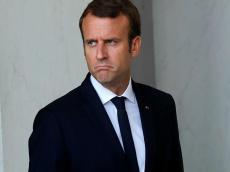|
|
TODAY.AZ / Politics
US attacked Macron: "He's messing with Hamas"
25 July 2025 [11:11] - TODAY.AZ

A diplomatic conflict is brewing between Washington and
Paris after French President Emmanuel Macron announced his intention to
officially recognize Palestine as an independent state. This step, which France
plans to take at the UN General Assembly in September, has provoked a sharp
reaction from the United States and Israel.
U.S. Secretary of State Marco Rubio publicly condemned
Macron's initiative, calling it "reckless" and "serving the
interests of Hamas."
"The United States strongly rejects Emmanuel Macron's
plan to recognize a Palestinian state. This reckless decision only serves the
propaganda of Hamas and hinders the establishment of peace. It is a slap in the
face to the victims of the events of October 7," Rubio wrote.
The Israeli leadership also criticized the move. Prime
Minister Benjamin Netanyahu stated that recognizing Palestine amid the ongoing
conflict would effectively legalize terrorism. Israeli Foreign Minister Israel
Katz called Macron's decision a "disgrace" and a "reward for
terrorists."
In response to the criticism, Macron emphasized that
recognizing Palestine is not a gesture of support for extremism, but rather an
effort to revive the idea of a two-state solution and pressure Israel to cease
fighting in Gaza. According to him, without political recognition of
Palestinian statehood, it is impossible to talk about a just and sustainable
peace.
France is likely to become the first country from the Group
of Seven to officially recognize Palestine. To date, more than 140 countries
have already done so, including Russia, China, India, and many nations in the
Global South.
The disagreement between the allies has become especially
noticeable following the collapse of recent negotiations in Doha. The United
States and Israel suspended their participation in the discussions, citing the
uncompromising stance of Hamas. Meanwhile, the humanitarian crisis in Gaza
continues to worsen, with increasing civilian casualties.
The Palestinian Authority and Hamas, in turn, welcomed
Macron's statement. Hamas called it "historic" and urged other
European countries to follow France's example.
The United States has already made it clear that such a move
could have consequences for relations with France.
URL: http://www.today.az/news/politics/260920.html
 Print version
Print version
Connect with us. Get latest news and updates.
See Also
- 25 February 2026 [12:12]
Peace agenda and memory of Khojaly are impossible without each other - 25 February 2026 [11:59]
President Ilham Aliyev attends opening of Lankaran State Vocational Education Center - 25 February 2026 [11:39]
President Ilham Aliyev sends congratulatory letter to Emir of Kuwait - 24 February 2026 [15:21]
Delegations from parliaments of Türkiye and Georgia visit Alley of Honor and Victory Park - 24 February 2026 [15:09]
Jeyhun Bayramov meets Turkish and Georgian delegations to boost regional cooperation - 24 February 2026 [14:38]
President Ilham Aliyev orders additional measures to improve drinking water supply in Nakhchivan - 24 February 2026 [14:14]
Remote privatization: how Ruben Vardanyan "distributes" earth from camera - 24 February 2026 [13:13]
Lords and baronesses got entangled in controversy over “Armenian question - 24 February 2026 [11:38]
President Ilham Aliyev sends congratulatory letter to President of Estonia - 23 February 2026 [13:13]
Guarantees of peace from Armenia: questions remain
Most Popular
 Guarantees of peace from Armenia: questions remain
Guarantees of peace from Armenia: questions remain
 Greece working with another 4 European countries to set up migrant deportation hubs outside EU
Greece working with another 4 European countries to set up migrant deportation hubs outside EU
 Azerbaijani NGOs urge UK parliament to halt “biased” inquiry on Karabakh
Azerbaijani NGOs urge UK parliament to halt “biased” inquiry on Karabakh
 US top general Caine thinks war with Iran can be 'easily won'
US top general Caine thinks war with Iran can be 'easily won'
 Vietnam plans national database center to fight misinformation
Vietnam plans national database center to fight misinformation
 Remote privatization: how Ruben Vardanyan "distributes" earth from camera
Remote privatization: how Ruben Vardanyan "distributes" earth from camera
 Lords and baronesses got entangled in controversy over “Armenian question
Lords and baronesses got entangled in controversy over “Armenian question
